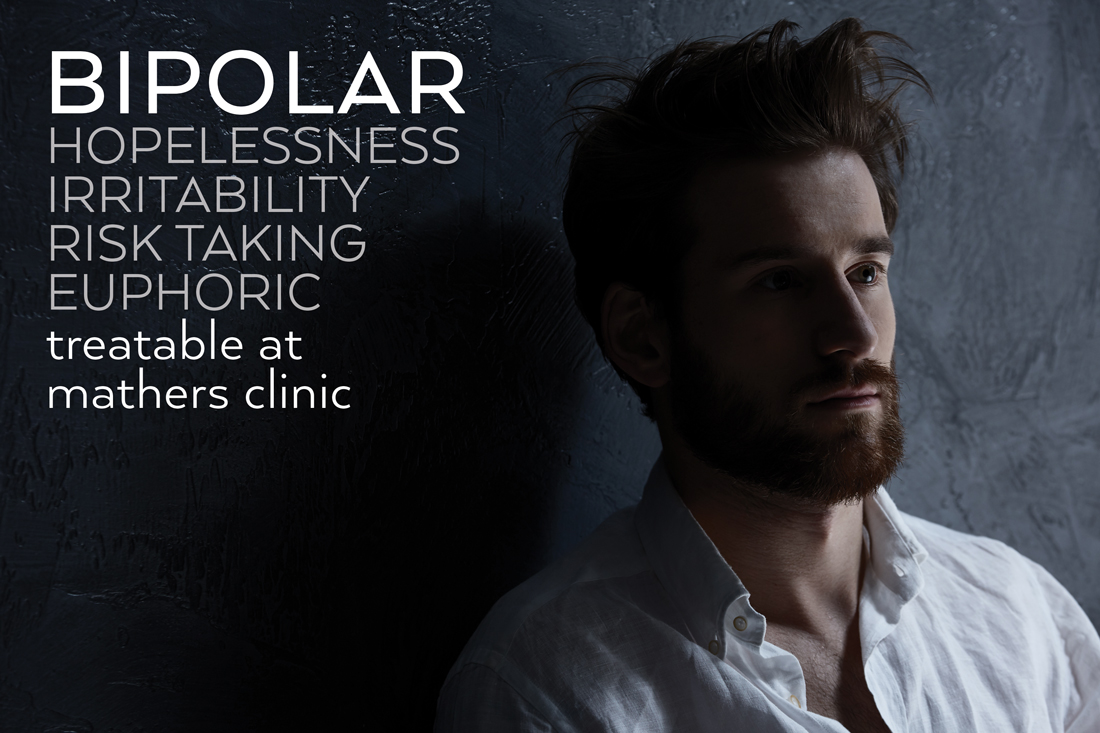BIPOLAR DISORDERS
OUR SERVICESFacts About Bipolar Illness / Disorder
Facts About Bipolar Illness
- More than 2 million Americans have manic-depressive illness. It is extremely distressing and disruptive to their lives.
- Like any serious illness, bipolar disorder also creates problems for spouses, family members, friends, and employers.
- Family members of people with bipolar disorder often have to cope with serious behavioral problems (such as wild spending sprees) and the lasting consequences of these behaviors.
- Bipolar disorder tends to run in families, and there is strong evidence that it is inherited. However, despite ongoing research efforts, a specific genetic defect associated with the disease has not yet been identified.
- Bipolar illness has been diagnosed in children under age 12, although it is not common in this age bracket. The symptoms can be confused with attention-deficit/hyperactivity disorder, so careful diagnosis is necessary.
What Is Bipolar Disorder?
The distinguishing characteristic of Bipolar Disorder, as compared to other mood disorders, is the presence of at least one manic episode. Additionally, it is presumed to be a chronic condition because the vast majority of individuals who have one manic episode have additional episodes in the future. The statistics suggest that four episodes in ten years is an average, without preventative treatment. Every individual with bipolar disorder has a unique pattern of mood cycles, combining depression and manic episodes, that is specific to that individual, but predictable once the pattern is identified. Research studies suggest a strong genetic influence in bipolar disorder.
Bipolar disorder typically begins in adolescence or early adulthood and continues throughout life. It is often not recognized as a psychological problem, because it is episodic. Consequently, those who have it may suffer needlessly for years without treatment.
Effective treatment is available for bipolar disorder. Without treatment, marital breakups, job loss, alcohol and drug abuse, and suicide may result from the chronic, episodic mood swings. The most significant treatment issue is noncompliance with treatment. Most individuals with bipolar disorder do not perceive their manic episodes as needing treatment, and they resist entering treatment. In fact, most people report feeling very good during the beginning of a manic episode, and don’t want it to stop. This is a serious judgment problem. As the manic episode progresses, concentration becomes difficult, thinking becomes more grandiose, and problems develop. Unfortunately, the risk taking behavior usually results in significant painful consequences such as loss of a job or a relationship, running up excessive debts, or getting into legal difficulties. Many individuals with bipolar disorder abuse drugs or alcohol during manic episodes, and some of these develop secondary substance abuse problems.

What Is A Manic Episode?
A manic episode is an abnormally elevated, expansive or irritable mood, not related to substance abuse or a medical condition, that lasts for at least a week, and includes a number of disturbances in behavior and thinking that results in significant life adjustment problems. Chronic behavior that appears somewhat similar to manic behavior is more likely ADHD or evidence of personality problem.
It may be helpful to think of the various mood states in manic-depressive illness as a spectrum or continuous range. At one end is severe depression, which shades into moderate depression; then come mild and brief mood disturbances that many people call “the blues,” then normal mood, then hypomania (a mild form of mania), and then mania.
Some people with untreated bipolar disorder have repeated depressions and only an occasional episode of hypomania (bipolar II). In the other extreme, mania may be the main problem and depression may occur only infrequently. In fact, symptoms of mania and depression may be mixed together in a single “mixed” bipolar state.
Features Of A Manic Episode
- Extreme irritability & distractibility
- Excessive “high” or euphoric feelings
- Sustained periods of unusual, even bizarre, behavior with significant risk-taking
- Increased energy, activity, rapid talking & thinking, agitation
- Decreased sleep
- Unrealistic belief in one’s own abilities
- Poor judgment
- Increased sex drive
- Substance abuse
- Provocative or obnoxious behavior
- Denial of problem
Features Of A Depressive Episode: (Bi-Polar Depression)
- Persistent sad, anxious, or empty mood
- Feeling helpless, guilty, or worthless
- Hopeless or pessimistic feelings
- Loss of pleasure in usual activities
- Decreased energy
- Loss of memory or concentration
- Irritability or restlessness
- Sleep disturbances
- Loss of or increase in appetite
- Persistent thoughts of death
Contact Mathers Clinic
Contact us to schedule an appointment with a psychiatrist or for more information about our services by calling (815) 444.9999. You may also email us at info@themathersclinic.com. We look forward to helping you meet with a psychologist at a time that works well for you.
815.444.9999 |
|
Some Facts About Unipolar Disorders
Unipolar Disorder is also known as”Major Depressive Disorder,” is characterized by a persistent feeling of sadness. One who suffers from unipolar disorders has a lack of interest in everyday life, finding joy in nothing. People suffering from unipolar illness focuses on the “lows,” or constant negative emotions.
Fortunately, unipolar disorders are easily treated with both therapy and medication. At Mathers Clinic, our highly trained staff are ready to help you with any unipolar disorders you may be suffering from: Seasonal Affective Disorder, Psychotic Depression, Postpartum Depression, Melancholic Depression and Catatonic Depression.
Download Self-Rating Scale
Please download, print and fill out the form below. Do you need Adobe Acrobat Reader DC? It’s free – CLICK HERE.

Respectfully Caring for the Emotional Well Being of Individuals & Families.
Crystal Lake Office
145 South Virginia Street
Crystal Lake, Illinois 60014
phone: 815.444.9999
fax: 815.986.1363
Monday 8:00am - 7:00pm
Tuesday 8:00am - 7:30pm
Wednesday 8:00am - 6:00pm
Thursday 8:00am - 5:00pm
Friday 8:00am - 5:00pm
Saturday 9:00am - 12:00pm
Sunday Closed
Woodstock Office
715 West Judd Street
Woodstock, Illinois 60098
phone: 815.444.9999
fax: 815.986.1363
Monday 9:00am - 5:00pm
Tuesday 9:00am - 7:00pm
Wednesday Closed
Thursday 9:00am - 7:00pm
Friday 8:00am - 5:00pm
Saturday Closed
Sunday Closed
Mathers Community Mental Health Center Affiliates:
THE MATHERS RECOVERY
Federally licensed facilities for opiate/opioid treatment. Full range service for detoxification.